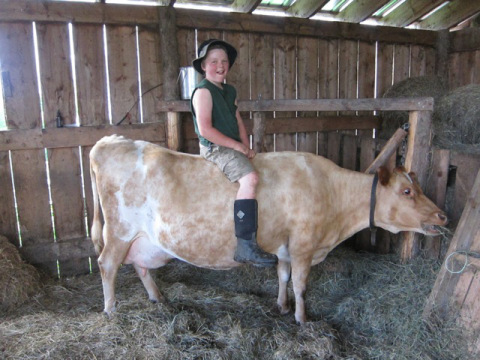Saddle Up
Over the past few weeks, a number of folks have expressed surprise that I was so candid about my family’s finances in the pages of $AVED. To be honest, I don’t see as I had much choice in the matter: How could I expect readers to trust in my story without such candor? Specifically, how could I expect readers to trust my contention that money is not a particularly sound emblem of wealth unless it was clear that I trusted that contention myself? True, the fact that my family lives on about $3ok/year is not proof of that trust, but it is at least indicative of it. It’s at least evidence – perhaps not definitive evidence, but evidence nonetheless – that’s I’m not a complete hypocrite.
And there’s this: I find it totally baffling that money has become such a taboo subject in our society. Given the universality of its role in our lives, and given the incredible power it holds over us, wouldn’t you think we’d want to talk about it? And not merely in generic terms, but in specifics? Aren’t you curious how other people manage their finances? How much they make, and how they budget? Aren’t you curious about their relationship to money, whether they feel suffocated by money, or liberated by it?
Actually, I think people do want to talk about these things; they’re just not always sure how. What I’ve found is that most people, when given the opportunity, are glad, if not grateful, to talk about money. Interestingly, this seems particularly true of the working class, who, from my limited experience, don’t seem nearly as reticent as upper income classes to discuss the specifics of income and expenditures and so on. Or maybe I think this simply because the vast majority of the people I consort with are working class; in other words, my samples are tilted heavily blue collar. On the other hand, I think it’s also possible that folks with more money than they need (and for the record, I would include myself in this category, particularly given that I know numerous families that live on less than $30k/year) really are less comfortable talking about money. Maybe there’s a little lingering guilt that they have it so good, or maybe they’re more a part of the culture that clings to the unspoken rule that talking about money is in poor taste.
Over the past week, Penny and I have talked about money in great detail with some friends who live on less than $20k annually. They have two children, and work on a farm (and yes, they receive federal and state benefits in the form of health care and food subsidization). They are also some of the most honest, hardest working, and well-loved people I know. Even when their benefits are accounted for, they live on much less than my family, and our discussions with them have provoked Penny and me to examine our spending habits even more thoroughly.
It’s not so much that we think there’s anything particularly noble about living on that much less than we do (on the other hand, maybe there is); it’s more that we can see ways that we might be further liberated if we could trim our budget. And there are things we want to do in the coming years – not things, but experiences we want to have – that will require money. The fact is, we’re not exactly socking away the savings these days. It’s pretty much dollar in, dollar out ’round these parts.
So what do we spend our money on? That, perhaps, is good fodder for another post, but long story short (and perhaps to no one’s surprise but our own), the damnable horseless carriage and its insatiable appetite for fuel is by far (and I do mean by FAR) our largest expenditure.
What to do about it? That, my friends, is a very thorny question.

Ben Hewitt's Blog
- Ben Hewitt's profile
- 37 followers




